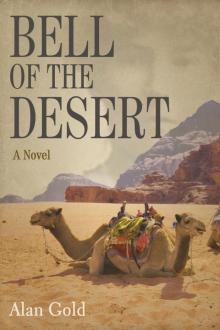Bell of the Desert Read online
Page 4
“Excellency,” she said, “there is much wrong in my country. But there is much right. Soon women will be able to vote. I hope that one day all women will be educated so that they will understand what it is they’re voting for. But you cannot suppress half your nation by forcing them to remain at home to do service to their men. Can’t you see the terrible waste of capacity when half of your country cannot contribute?”
“Are you always so free with giving advice, girl? You have not lived many years, yet you feel free to tell me about my religion and how my lands should be governed.”
“It’s easy to advise others, Excellency, even though I would be very hesitant before taking my own advice. I see the situations of others quite clearly, but my life is somewhat tumultuous, I’m afraid.”
He sighed long and hard. “Ah, Chatrude Pell, you are much like the whirlwind in the desert. You cause confusion and there is much sand and dust flung into the air whenever you speak, but in the end you disappear as though nothing had happened. And the desert returns to the way it had always been, and always will be.”
She was hurt by his dismissal, but countered, “Sometimes, Excellency, a strong wind is necessary to blow away the dust of ages and reveal what treasures lay buried.”
Abd al-Rahman laughed. “And are you that wind?”
“Perhaps.”
“Then you must change your sex, because no woman will ever be able to rule the men of the desert. Not even you, Chatrude Pell.”
TWO
Teheran, Persia, May 1892
It was two years from the moment she’d set eyes on Abd al-Rahman until Gertrude was able to fulfil her heart’s desire and visit the land of the Arab. During that time, she’d traveled around the world with her chaperone and devoured everything she could about Arabic culture, language and traditions. She’d now come close to mastering the language and had gained a greater appreciation of the role of women in Arabic society.
She and Billy Lascelles had already come close to Arabia when they’d enjoyed a brief holiday in Constantinople, explored its Blue Mosque, its Hippodrome and Hagia Sophia, boated on the Bosphorus and sailed the Hellespont. She’d determined to learn more Arabic, especially the classical underpinnings of the modern language as soon as she arrived in Jerusalem, but now she was in Persia and was determined to come to grips with ancient Persian.
Gertrude revelled in her freedom, of movement and thought, and was delighted to be away from fusty fussy old England. She now knew that at the age of twenty-four, her chances of snaring a husband were growing more and more limited by the hour. She’d had years of coming out balls and parties, and it was generally acknowledged by English societal rules that a few seasons was all a girl was entitled to strive for marriage before retreating to the sides of the room where wallflowers became faded blossoms who inevitably were disparaged by society as withered and lonely old maids and decrepit aunts.
There were times when her body overwhelmed her mind, and she ached for a man to hold her, hug her, enter her, make love to her. But all she had available were books which were a poor but necessary substitute for the real thing. She knew the opening lines of Jane Austen’s Pride and Prejudice by heart: “It is a truth universally acknowledged, that a single man in possession of a good fortune, must be in want of a wife.
”
What sublime irony, both for Jane’s Regency readers and Gertrude’s modern reality. She was in possession of a good fortune and was in want of a husband. Her family was immensely wealthy but no matter how much she tried to attract a suitable young man, none had stepped forward and proposed. Were she Miss Elizabeth Bennett, she would have grabbed the hand of Mr. Darcy the moment he asked her to marry him, and not spent the entire book rejecting him, until slowly coming round to see his better points before finally saying yes.
At her age, even though she had never felt more vital, alive, and vibrant, society determined that she no longer be viewed as eligible. She knew she was a curio, bright, intelligent, attractive, yet rejected by England’s eligible young men, whose eyes glazed whenever she began to talk about what interested her, and not feign interest in what they’d done the previous Saturday night.
Gertrude had become all-but invisible in England, and even in her own heart, she was coming to terms with a life of sexual frustration and loneliness. So instead of partnering a husband and supporting him in his career, instead of being a splendid hostess at the centre of sparkling soirees with her own clique of artists and scientists and philosophers and politicians meeting regularly at her house to engage in the most spirited of conversation, she would now have to make her own way in the world. Like Mr. Keats, she would make a virtue of being alone and palely loitering. She would have to become a somebody and not a somebody’s wife.
And she’d determined that Persia, mysterious and exotic Persia, was the place for her to become someone, to make society appreciate her difference, and not exclude her because of it. Since meeting Abd al-Rahman with Frank and Mary in Bucharest, she’d studied Persia and Farsi, Arabia and the Arab society, becoming more and more involved in learning the politics and customs of the area. It was virtually unknown to Englishmen, yet it was utterly absorbing.
She and Mary had left England, joined the Orient Express train in Paris and journeyed to Constantinople where they took a boat to join Frank Lascelles, who’d recently been appointed the British envoy to Shah Nasser al-Din Shah Qajar, the King of Persia. Nasser was an interesting man who’d ruled the land with an iron hand for fourteen years since he succeeded his father at the age of seventeen. Very close to Britain and keen to import modern technology and business methods, Nasser had returned to Persia from his state visits to Queen Victoria, enthused by the progress England had made, and determined to enlist the very best inventions for the improvement of his country. It was the reason that an ambassador of Frank’s seniority had been appointed to advise the Peacock Throne.
As they journeyed by carriage along dusty and pitted roads from the Caspian Sea towards Teheran, Mary kept fanning herself, still finding it difficult to acclimatize to the heat of the desert. Gertrude reached into her bag and pulled out a bottle of eau de toilette, which Mary gratefully accepted. She splashed some on a handkerchief, and wiped it over her neck and forehead. The dusty air of the carriage was immediately transformed into a Parisian perfumerie.
“Frank tells me the Shah has eleven sons. Perhaps you’ll find a suitable husband amongst them,” Mary said.
Gertrude burst out laughing. “He also has ten daughters, and so I’m sure many of the suitable young men have already been accounted for.”
“Good heavens, you don’t mean that Persians are like the ancient Egyptians do you, and marry their sisters?”
“No,” said Gertrude. “I was being facetious. But they marry their royal children off early for political reasons, just as the English monarchs did in the Middle Ages. Anyway, can you seriously see father accepting a Persian for a son-in-law?”
“Doesn’t he like Arabs?” Mary asked.
“Persians aren’t Arabs. They’re Shi’ite Muslims of the tribe of Qajars. They were originally of Turkman origin.”
“Well, they’re all Arabs to me, I’m afraid.”
~
When they arrived at the embassy, a large party of officials had gathered outdoors to greet them. Every counsellor, attaché, secretary, official, and supernumerary lined up outside the vast portico to pay his respect. Frank greeted his wife with a hug and kissed Gertrude on both cheeks. He took them along the line, introducing them to each of his staff. Towards the end where the lesser officials stood waiting was a tall and ruddy young man, who kept staring at Gertrude as she neared his station.
“Gertrude,” said Sir Frank, “this is Mr. Henry Cadogan, my Third Secretary.”
Cadogan shook her hand. Unlike many of the other hands she’d shaken along the line, Cadogan’s were warm but dry. His handshake lingered a fraction longer than was necessary. She looked up at him, surprised. Was there a glint in
his eye as he looked at her? He was an attractive man, slightly too lean for her taste, but he had a pleasant and accommodating face and a delightfully playful grin when he let her go. It was almost as though he were daring her to continue looking at him, throwing protocol and convention to the garden’s perfumed wind.
As they continued to move down the line nearing the front door and food, drink, and rest, Cadogan peremptorily called out, “Ambassador, I wonder if I might seek your permission to be privileged to show Miss Bell the more beautiful parts of Teheran.”
Surprised at his presumption, Frank was about to make a curt remark, when Gertrude said quickly, “How kind . . . if that’s acceptable to you, Your Excellency.”
Frank shrugged and continued to introduce his wife and niece to the servants who would see to their every wish. As Gertrude continued to walk behind her uncle, she sneaked a quick look back at Cadogan, who was staring regimentally ahead, but wearing a large grin.
~
It was a journey of nearly 500 miles through empty broiling deserts and past encampments of black tents and wildly excited children who’d never seen a large party of nobility and their servants before, let alone two white women with unveiled faces, riding side-saddle on their horses. As they rode, husbands ordered their wives back into the tents, but despite commanding their children not to approach the party, the little ones screamed in delight as the English people threw sweets and coins onto the roadways.
Gertrude, Mary, Henry Cadogan and a dozen servants traveled directly south from Teheran towards ancient Persepolis. She had been in Persia for two weeks, luxuriating in the fragrances of the vast gardens of the embassy, walking with Henry around the centre of Teheran and thrilling at the extraordinarily delicate yet imposing Islamic architecture of the palaces of Saad Abad, Golestan, and Niavaran. But ever since Henry had described the wonders of Persepolis, city of Darius the Great and his son Xerxes, built five centuries before Christ, she’d been itching to see it. He’d warned that it was still buried underneath two and a half thousand years of sand and debris, but she’d brought along spades and brooms, and was determined to expose some of the city.
She and Henry had shared memorable experiences since she arrived at the embassy. He was attentive, polite and, most attractively for Gertrude, knowledgeable. Whatever she asked him about art, architecture, history, or the culture of the Persians, he seemed to know immediately, or he admitted his ignorance, and promised to have the answer for her by the time she appeared for dinner that night.
It took a mere three days for her to feel fondness and affection for him, and to eagerly anticipate their rides, picnics and times together. Another three days, and she was seeking him out wherever he was within the Embassy, finding excuses for interrupting his work and asking him questions. And by the end of the second week, before setting out for Persepolis, her heart was aflutter whenever she saw him. And she knew, with absolute certainty, that he felt the same towards her. They’d held hands, he’d put his arm around her and had kissed her several times on the hand saying goodnight. She eagerly anticipated this long ride south to the ancient city, to see where their conversation and affection would take them.
They continued to ride inexorably onwards, Mary finding the horses much less comfortable than Gertrude, who’d spent her childhood on the back of a horse riding around the grounds of her estate. Mary looked in envy at Gertrude’s skills as a horse-woman. She seemed to be born to a saddle. As the sun began to sink low into the western desert, without warning, five of their servants suddenly spurred on their horses to disappear ahead of them down the road. It was to enable the party of English people to ride at their leisure until dusk fell. When it did fall, it came on very quickly in the desert, and when the air rapidly changed from stiflingly hot to cool, with a freezing clarity on its way as the sky blackened and a galaxy of stars suddenly appeared, a warm fire, hot food, and comfortable tents would already be prepared and waiting for them.
~
Wrapped up snuggly against the freezing night, Gertrude lay on her back, far from the tents and the fire, enshrouded in the blackness of the desert, and gazed directly upwards. She’d done it every night since leaving Teheran and entering the vast wasteland which was Persia. No matter how long she stared at the profusion of stars, their brilliance always brought her to the brink of tears. The enormity of the stellar canopy made her feel tiny, made her problems seem insignificant and trivial.
The Persian sky was so different from the English sky, confined to a ridiculously tiny number of stars struggling to be visible through the smoke and grime, even in the North England countryside where she lived. Rarely did she have a clear, cloudless night to observe the firmament. Yet in the desert, there were rarely clouds to cover the heavens and looking upwards at nature’s miracle seemed to put everything into a more profound perspective. And she thought back to a night in a king’s hunting lodge in the Carpathian Mountains, when an Arab named Abd al-Rahman had challenged her sense of understanding of the nature of womanhood.
As she gazed heaven-wards, she heard a noise of somebody approaching. “Am I disturbing you?” asked Henry.
“No. Actually, laying here and looking up with somebody else will make me feel less small.”
He lay down beside her, close to her, and together they gazed upwards, silent for some time, lost in the wonders above them. Softly, he said, “When I was at the embassy in Peru, I climbed the foothills of the Andes, and the stars were very dramatic there. But here . . .”
“Every time I gaze upwards,” she said, “my mind flies back to Moses and Jesus and Mohammed and I can clearly see who they were and what they did from the perspective of their times. Today, with our Anglican churches and Catholic cathedrals and Mosques, it’s all too easy to see the buildings as representing the prophets, but when you step into their shoes and walk in their paths and see the same sky they saw, it’s so much easier to connect to the reason they needed to invent a deity, isn’t it?”
“But think back before Moses, to the days before monotheism,” said Henry. “Think of the Hittites and the contribution they made to our ways of understanding the natural phenomena. How terrifying lightning and thunder and drought and hailstorms must have been to minds which were pre-scientific. How else to explain swarms of locust or earthquakes or volcanos erupting suddenly? No wonder they invented all those fearsome and angry gods to explain whatever catastrophe was happening around them.”
She remained silent for what seemed an eternity, echoing the stillness of the night, adrift in the warmth of her thoughts. In the freezing night air, wrapped underneath a blanket, Gertrude could feel Henry shivering. “Would you like to share my blanket?” she whispered.
Wordlessly, he moved closer to where she was laying. He thanked her, and she felt the cold skin of his arm touching her warmth, their legs now together. It was the closest she’d been to a man in . . . she tried to remember the last time. She discounted her momentary closeness to Abd al-Rahman in the Carpathians. No, the last time she’d been this close to an eligible man was at a dinner party at Lord and Lady Russett’s house on Sloan Square in London where a young and silly lad had held her knee under the table. When she’d turned to tell him not to touch her, he’d given her the most ridiculous wink. Instead of being cross, she burst out laughing at his dismal attempt at seduction, but he’d taken it as encouragement, and she’d spent the whole night trying not to be groped.
But her closeness to Henry was altogether of a different complexion. He was a young man of erudition, of warmth, and of respect. Like her, and from the way he was speaking, he was an atheist, completely unbothered by the pretence of worshipping a deity, but accepting that natural phenomena had created all things on Earth and in the heavens. And he was well-read, knowledgeable, sophisticated, and delightful company.
“Miss Bell, Gertrude, I wonder if I should be under a blanket with you? It’s not exactly the done thing, is it?”
“You’re right, Henry. It’s one thing to kiss my hand, but
entirely another to lay on a bed of sand where anything could happen. I shall call over to Mrs. Lascelles and ask her to come between us as chaperone.”
He burst out laughing and moved his hand fractionally to hold hers. “Sir,” she said, “I do believe you’re touching me!”
“Ma’am,” he replied, “I crave your forgiveness. I thought I was grasping the hand of the Goddess of the Sand.”
“But that would mean I’d slip through your fingers.”
“Not while you’re in Persia.”
“And when I return to England? What then?” she asked softly.
He sighed. “May I speak frankly?”
She remained silent, and felt her heart beating rapidly. She’d only known Henry two weeks, yet in that intense and contracted time she felt increasingly drawn to him. He was the most delightful companion and she felt a delightful and growing closeness. Not since she was at Oxford had she enjoyed another person’s company as much. She revelled in their riding together, reading books of Persian poetry, sharing picnics and sampling the delights of the shuks and street traders and market salesmen following them around the streets of Teheran importuning them to buy whatever knickknacks they were desperate to sell. They’d been into Mosques and Synagogues and Churches together. And even though many of their trips had been alone, unchaperoned, he’d behaved like the perfect gentleman, attentive, respectful, but quite obviously admiring her in every way. She was keen . . . more than keen . . . for his affection.
“Gertrude, I know I’m only the third secretary and I earn a pittance. But I have great hopes of advantage in serving the crown in a future capacity as an ambassador. We’ve only known each other a short while, Gertrude, but I want to assure you that my prospects are good, and my—”
“Henry? What are you saying? Is this a proposal of marriage? My dear, we’ve only been intimate this once, and you’re telling me about your future. You’re a sweet and dear man, but we’re nearing the twentieth century, so don’t you think you ought to kiss me before you go down on your knees and ask me to be your wife?”

 Birthright
Birthright The Pretender's Lady
The Pretender's Lady The Mechanic
The Mechanic Bloodline
Bloodline Bell of the Desert
Bell of the Desert Bat out of Hell
Bat out of Hell Stateless
Stateless